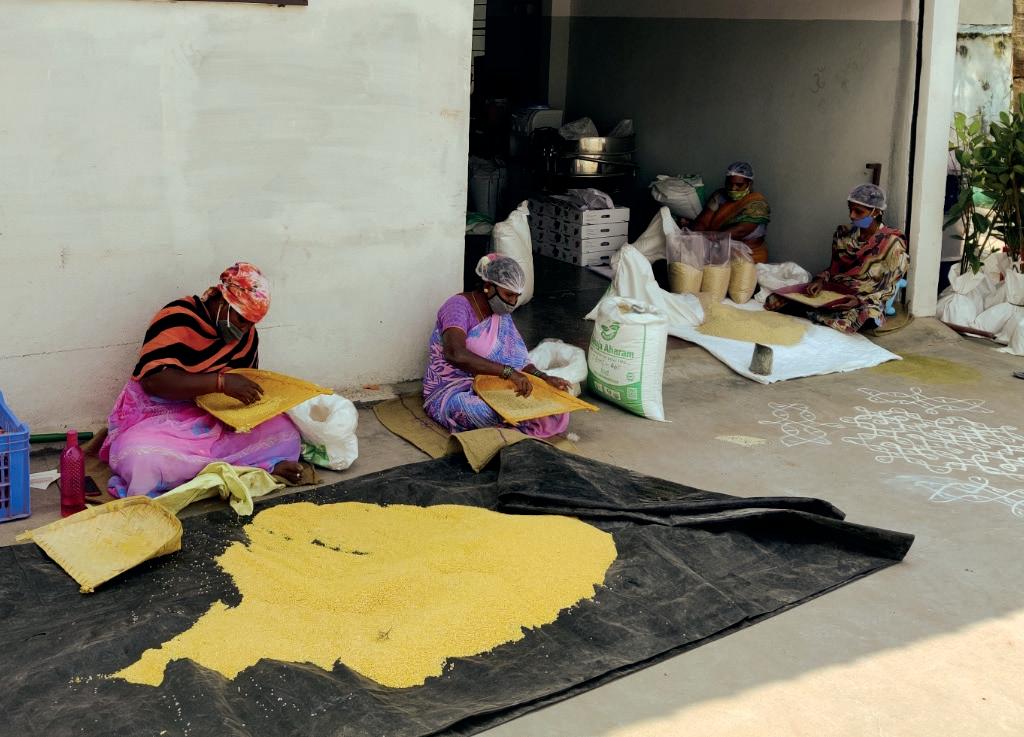Prøve GULL - Gratis
Organic takeover
Down To Earth
|August 16, 2022
A federation of farmer-producer organisations taps into the growing organic market to help members raise incomes

CATERING DIRECTLY to the consumers' needs assures better marketability and incomes. This is what nearly 10,000 farmers of Telangana and Andhra Pradesh have realised over the past decade and are now steering a silent organic movement.
It all began in 2009, when a group of consumers in Hyderabad, then part of unified Andhra Pradesh, established a cooperative society to source chemical-free produce directly from farmers. Operating under the guidance of the Centre for Sustainable Agriculture (CSA), a Hyderabad-based research nonprofit, the cooperative society over a period of time roped in a few farmers and began to sell the produce through a farmer-run retail store in Secunderabad and mobile retail vans that travelled to urban areas. Soon, more and more organic farmers joined the cooperative society and what had started off as a consumers' initiative became a farmers' group. In 2013, when the government floated the concept of farmer producer organisation (FPO) to aggregate collection of produce and create market links for better prices under the Companies Act of 2013, CSA and the cooperative society saw this as an opportunity.

Denne historien er fra August 16, 2022-utgaven av Down To Earth.
Abonner på Magzter GOLD for å få tilgang til tusenvis av kuraterte premiumhistorier og over 9000 magasiner og aviser.
Allerede abonnent? Logg på
FLERE HISTORIER FRA Down To Earth

Down To Earth
THINK TWICE BEFORE FELLING SAL TREES
Many trees considered to be affected by sal borer in the 1990s are still alive today
1 mins
February 16, 2026

Down To Earth
EDGE OF SURVIVAL
Caste divides deny marginalised communities land, resources and essential aid, leaving them more vulnerable to climate disasters
6 mins
February 16, 2026

Down To Earth
A WISH LIST?
Union Budget for 2026-27 conveys the impression of a roll-call of intentions and ambitious proposals, with little detail on their formulation
6 mins
February 16, 2026
Down To Earth
Break down the gender wall
THE RULING National Democratic Alliance (NDA) government has been heavily invested in the goal to make India a developed economy by 2047.
2 mins
February 16, 2026

Down To Earth
MENSTRUAL HEALTH, NOW A FUNDAMENTAL RIGHT
In a landmark judgement, the Supreme Court has recognised menstrual health and hygiene as a fundamental right under Article 21 of the Constitution of India, which guarantees the right to life and dignity.
8 mins
February 16, 2026

Down To Earth
Of devolution and new disasters
The 16th Finance Commission pushes for changes in view of new fiscal and climatic conditions
11 mins
February 16, 2026
Down To Earth
Rising risks of plastics
NEGATIVE IMPACTS on human health due to emissions linked to the plastic lifecycle could double by 2040, according to a study published in The Lancet Planetary Health in January.
1 min
February 16, 2026

Down To Earth
GAP BETWEEN EPIDEMICS NARROWING
A watershed-based and landscape-level approach is needed to address forest degradation
2 mins
February 16, 2026

Down To Earth
WAITING TO STRIKE
Sal heartwood borer is considered the biggest threat to forestry in India, especially to the sal tree, where it lives and breeds.
11 mins
February 16, 2026

Down To Earth
A SPRING DELIGHT
Mustard flowers are not meant only for the eyes. Invite them to your plate once in a while
3 mins
February 16, 2026
Translate
Change font size
